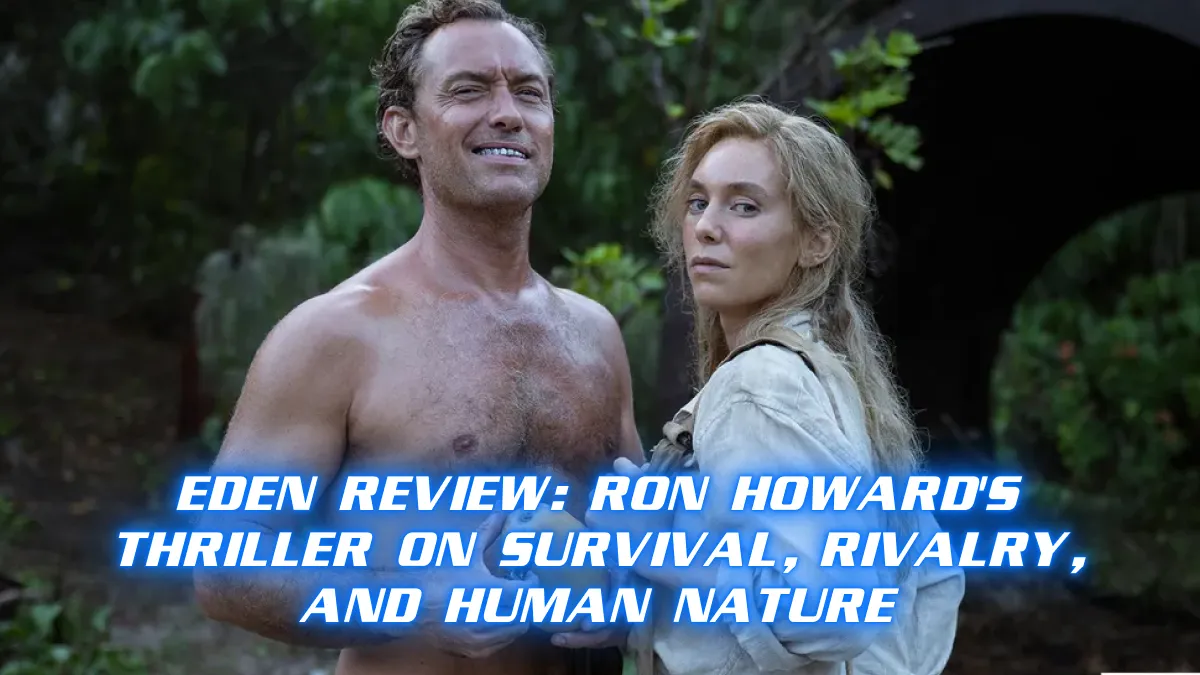Ron Howard’s latest cinematic venture, Eden, presents a gripping tale of survival, rivalry, and human nature. Based on real events, the film highlights a group of individuals whose attempts at freedom, renewal, and redemption are hampered by their base instincts and the harsh environment they inhabit.
Premiering at the Toronto International Film Festival, Eden blends elements of a biblical cautionary tale with a Lord of the Flies-like descent into chaos. This suspense-filled drama explores the darker sides of humanity and the psychological conflicts that arise when strangers are forced to coexist.
A Struggle for Survival on Floreana Island
Set in the winter of 1932, Eden follows the Wittmer family—Heinz Wittmer (Daniel Brühl), his wife Margret (Sydney Sweeney), and his son Harry (Jonathan Tittel)—as they arrive on the remote Galapagos island of Floreana. They plan to build a new life there, guided by the teachings of Dr. Friedrich Ritter (Jude Law) and his wife Dore (Vanessa Kirby). Both Friedrich and Dore had fled Germany in pursuit of an isolated life away from an increasingly fascist society.
Friedrich, a philosopher with a growing media presence back in Germany, holds a radical belief that life’s true meaning is found in pain and hardship. He and Dore live by this philosophy, with Friedrich even pulling out his teeth to prevent infection and Dore grappling with multiple sclerosis. They seek to rebuild civilization on their terms, but the arrival of the Wittmers throws their plans into disarray.
Building a New Life Amidst Hostility
Tensions immediately arise between the two groups. Friedrich and Dore, intent on preserving their isolated utopia, are wary of the Wittmers and send them to live in a barren cave on the island, far from the island’s scarce water sources. Heinz, however, proves to be resourceful and determined, transforming the desolate environment into a livable space for his family.
Despite the hostility and their unforgiving surroundings, the Wittmers start to thrive. Margret, initially appalled by her new reality, embraces the challenges and works alongside Heinz to create a self-sustaining homestead.
Their relative success sparks envy in Friedrich, who had initially expected the Wittmers to fail. However, before the tension between Friedrich and Heinz escalates into outright conflict, a new player enters the scene, bringing even more chaos to their fragile coexistence.
Enter Eloise Bosquet de Wagner Wehrhorn: The Baroness of Floreana
The arrival of Eloise Bosquet de Wagner Wehrhorn (Ana de Armas), a self-proclaimed “Baroness,” shatters any semblance of peace on the island. Eloise, accompanied by her engineer (Felix Kammerer) and bodyguard (Toby Wallace), makes a dramatic entrance, reminiscent of Cleopatra. Her goal is to build a luxury hotel, “Hacienda Paradiso,” on the island’s beach, disregarding the existing settlers.
Eloise’s presence becomes the catalyst for the ensuing disaster. With her flamboyant personality, she begins manipulating the dynamics between Friedrich and Heinz, stoking competition and sowing seeds of distrust. As supplies run low and tensions heighten, the small community on Floreana spirals into chaos.
The Clash of Ideals and Personalities
At the heart of Eden is the clash of ideals: Friedrich’s harsh, ascetic worldview versus Heinz’s pragmatic approach to survival. Friedrich’s belief that suffering leads to enlightenment is put to the test as he watches the Wittmers not only survive but thrive. Meanwhile, Eloise’s carefree, indulgent lifestyle, and manipulation of others further inflames tensions.
Friedrich and Dore’s relationship begins to deteriorate under the strain of isolation and jealousy. Friedrich, increasingly frustrated, becomes more erratic and hostile. In one of the film’s most striking scenes, he is shown furiously typing on a typewriter, reminiscent of Jack Nicholson’s character in The Shining. This growing instability underscores the psychological toll the island takes on its inhabitants.
A Harrowing Birth and the Descent Into Madness
One of the film’s most memorable and intense sequences is Margret’s harrowing experience of giving birth while being menaced by wild dogs. Left alone as Heinz is away, Margret’s labor is fraught with danger, highlighting the primal and unpredictable nature of life on the island. Her confrontation with the wild dogs, culminating in a feral growl of defiance, encapsulates the film’s raw depiction of human survival.
As food supplies dwindle and Eloise’s schemes grow more brazen, the settlers’ relationships become increasingly fractured. Friedrich’s philosophies, which once seemed idealistic and revolutionary, are exposed as dangerously flawed when faced with the reality of life on Floreana.
The Cinematic Power of Eden
Ron Howard masterfully builds tension through subtle, menacing interactions and visual cues. From sideways glances and barbed remarks to breathtaking yet harsh shots of the island’s unforgiving terrain, Eden paints a vivid picture of life on Floreana. The cinematography, helmed by Mathias Herndl, captures the island’s brutal beauty, with sweeping shots of sand, jagged rocks, and resilient wildlife that serve as a metaphor for the settlers’ plight.
Howard skillfully weaves in the film’s underlying biblical and philosophical themes without overburdening the narrative. The parallels to the Garden of Eden are clear, with Eloise as the serpent, tempting the settlers with her hedonistic plans and setting the stage for their downfall. Yet the film also critiques Friedrich’s Nietzschean ideals, suggesting that his philosophy, while intriguing, ultimately contributes to the group’s undoing.
The Performances: A Cast of Riveting Characters
The film’s star-studded cast delivers powerful performances. Jude Law portrays Friedrich with an intensity that makes his character both magnetic and unsettling. His portrayal of a man driven by a strict moral code, yet unraveling under the pressure of real-world challenges, is captivating. Vanessa Kirby complements Law as Dore, a woman torn between loyalty to her husband and the harsh realities of their chosen path.
Ana de Armas steals the show as Eloise, injecting the film with energy and chaos. Her portrayal of a woman who uses her sexuality and charisma to manipulate others is both seductive and sinister. Meanwhile, Sydney Sweeney shines as Margret, a woman who transforms from a reluctant settler into a fierce survivor.
Conclusion: A Story of Survival, Power, and Human Nature
Eden is a compelling exploration of human nature in extreme circumstances. Through its rich characters, philosophical undercurrents, and gripping tension, the film offers a fascinating look at how ideals crumble under the weight of survival. The film’s message is clear: paradise is never as idyllic as it seems, and the real danger often comes from within.
With stellar performances, a tightly woven narrative, and stunning cinematography, Eden stands as a thought-provoking thriller that explores the complexities of survival, power, and the human condition.



